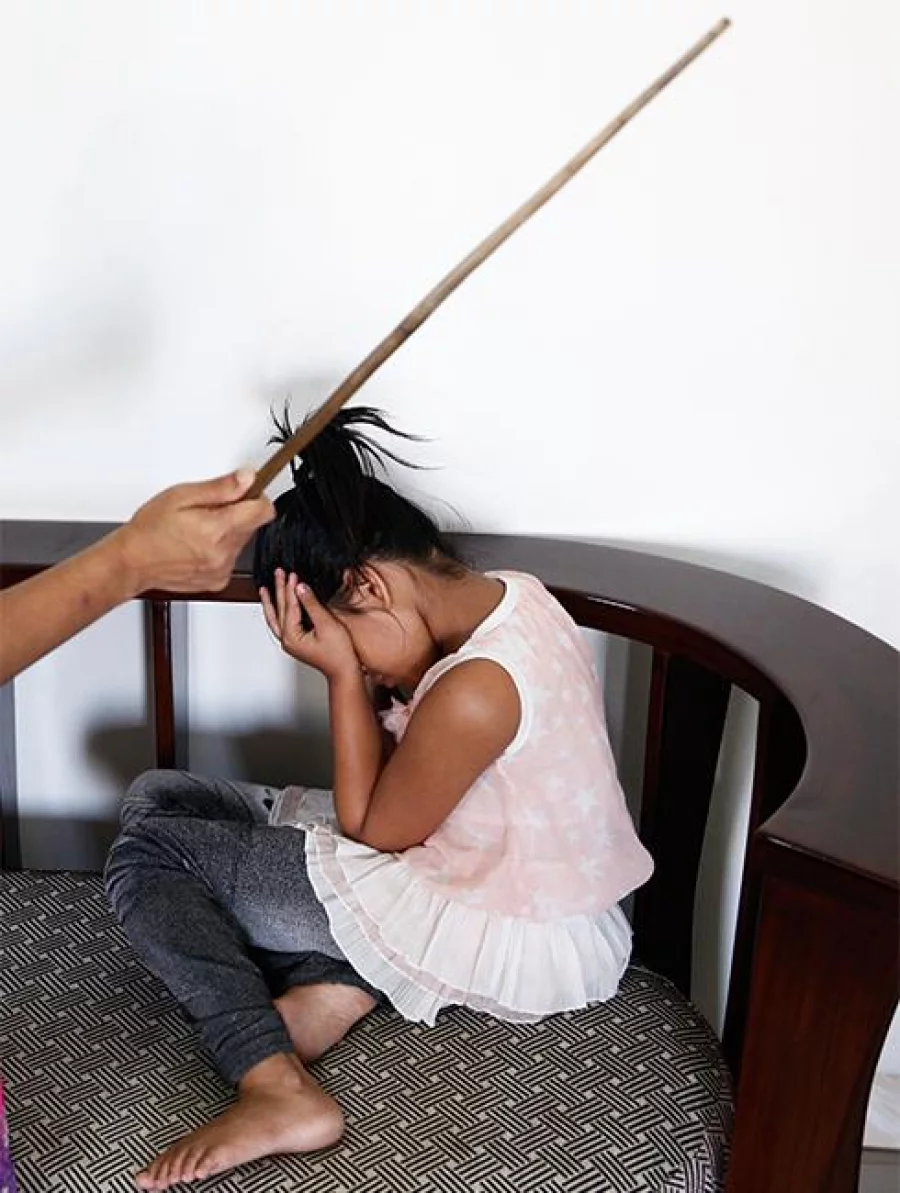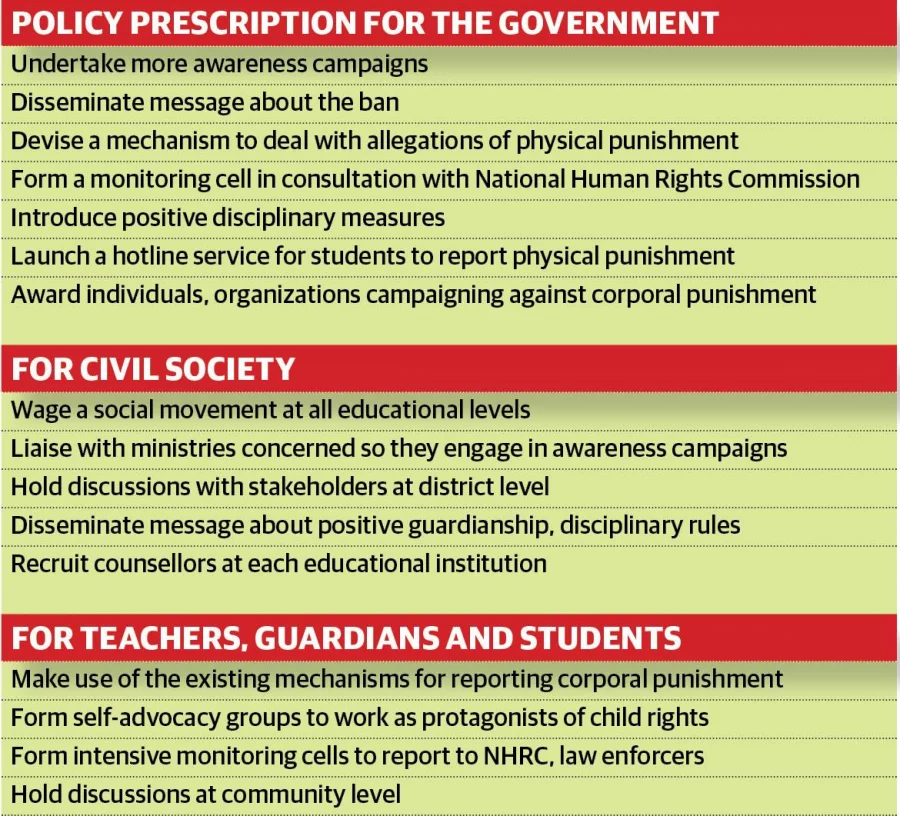Despite the ban on corporal punishment in Bangladesh, an astonishing 67% of parents in Bangladesh endorse the use of physical punishment in school to discipline their children, and 79% have admitted to hitting them at home, according to a recent survey.
Only 1% of guardians surveyed thought that hitting a child without a very specific reason is a violation of their rights.
Bangladesh Legal Aid and Services Trust (BLAST) with supports from Save the Children (SCI) has conducted the survey titled “Corporal Punishment on Children in Schools: Present Scenario and Preventive Responsibilities,” participated by a total of 126 people from both urban and rural areas in Dhaka and Chittagong.
In addition to the survey, the organizations conducted interviews and discussions with teachers, children and their guardians.
Of the parents who were surveyed, 69% thought that using corporal punishment on children is a useful tool to bring discipline to the classroom, 55% considered it to be an effective way of ensuring their children’s proper development, and 27% thought that children will be derailed if parents do not use physical punishment.

Illegal and punishable

Among the samples who were surveyed, 69% of parents thought that using corporal punishment on children is a useful tool to bring discipline to the classroom
Mehedi Hasan/Dhaka TribuneA signatory to the United Nations Convention on the Rights of the Child (CRC), Bangladesh in a 2014 report to the UN Committee on Child Rights said: “The issue of corporal punishment was taken by the Bangladesh government very seriously, and to prevent corporal punishment in all settings, especially in schools, several measures were taken, including issuing special instructions to all schools, bringing the perpetrators to justice, and providing training in alternative forms of disciplining.”
The National Children Policy 2011 stipulates that “all forms of physical and mental punishment in educational institutions shall be prohibited, and a child-friendly system of imparting lessons be introduced so that the children and the adolescents do not have any physical and mental injury.”
The Children Act 2013 too, expressly provides legal protection to children against physical violence. Section 70 of the act states that persons assaulting, ill-treating, neglects or forsaking any child under their custody, charge or care leading to an injury of health was a punishable offence.
In 2010, the government issued two circulars asking the heads of all educational institutions to identify teachers who use corporal punishment and take remedial measures in accordance with the institutions’ rules.
Following a petition filed by public interest groups BLAST and Ain o Shalish Kendra, the High Court said in a January 2011 judgment that “corporal punishment is a violation of children's rights and ordered that the practice be prohibited not only in schools, but across all settings.”
The real scenario
All teachers who participated in the survey believed that the use of physical punishment is the most effective way of controlling children in classroom. A small number of them, 13%, also thought that there are no other effective ways to do this.
On the other hand, 64% of guardians do not have the remotest idea about the laws that forbid using such punishment. The survey report says 79% of parents admitted that they have hit their children at home, while 90% said the practice is still prevalent at schools their children go to.
Half of urban parents said teachers contact them when their children break rules, while 58% of rural parents said their children are caned at school when they are found disobedient.
In response to a question as to whether they are aware of the ban on physical discipline, 55% of teachers reported not seeing or receiving any notification in this connection.
‘Corporal punishment rooted in culture’
Experts say the practice of physical punishment of children is rooted in Bangladesh’s culture.
They also cited lack of social awareness and parents’ ignorance as the reasons behind the normative support for corporal punishment.
Speaking to the Dhaka Tribune, noted educationist Rasheda K Chowdhury said: “There is a common belief among parents that educational institutions will make their children good human beings. And they think corporal punishment is a requirement for this. This concept has derived from our culture.”
According to a study from four years ago, 86% of parents were supportive of such punishment at school, but the situation has significantly changed thanks to different initiatives and campaigns to end physical and psychological punishment of children, she said.
Rasheda, however, added that the percentage is still very high at some places and that the campaigns should go on to make people aware of negative consequences of such punishment. The ramifications
The ramifications
The evidence that corporal punishment is harmful to children is overwhelming. Children in schools that use the punishment appear to perform significantly worse in their academic tasks, perceiving their schools as a frightening place.
According to the BLAST-IID study founded by Save the Children Bangladesh, 60% of guardians said children are not willing to go to school out of fear of being punished, and 47% reported finding their children scared of teachers.
A quarter of the parents said children become frustrated and depressed due to such punishment at school.
However, guardians who appear to be supportive of physical punishment believed that children getting such punishment will make them comply with their teachers’ instructions, help them become disciplined, and impart manners and etiquette.
Experts said corporal punishment of children may seem effective to some guardians or teachers, but in the long term, it is extremely harmful to children’s physical and psychological growth.
Ishtiaq Mannan, deputy country director at Save the Children Bangladesh, said physical discipline has both physical and psychological impacts on children.
Children subjected to corporal punishment often tend to demonstrate more violent and delinquent attitudes than those who are not, and when they are adults, they become supportive of such punishment, he explained.
“Sometimes, guardians and teachers are found unaware of the adverse effects of corporal punishment. They should concentrate on counseling to correct children rather than use physical discipline on them. There’s no way we can treat corporal punishment as normal.”
He emphasized finding alternative ways to discipline children at home and school.

 Among the samples who were surveyed, 69% of parents thought that using corporal punishment on children is a useful tool to bring discipline to the classroom Mehedi Hasan/Dhaka TribuneA signatory to the United Nations Convention on the Rights of the Child (CRC), Bangladesh in a 2014 report to the UN Committee on Child Rights said: “The issue of corporal punishment was taken by the Bangladesh government very seriously, and to prevent corporal punishment in all settings, especially in schools, several measures were taken, including issuing special instructions to all schools, bringing the perpetrators to justice, and providing training in alternative forms of disciplining.”
The National Children Policy 2011 stipulates that “all forms of physical and mental punishment in educational institutions shall be prohibited, and a child-friendly system of imparting lessons be introduced so that the children and the adolescents do not have any physical and mental injury.”
The Children Act 2013 too, expressly provides legal protection to children against physical violence. Section 70 of the act states that persons assaulting, ill-treating, neglects or forsaking any child under their custody, charge or care leading to an injury of health was a punishable offence.
In 2010, the government issued two circulars asking the heads of all educational institutions to identify teachers who use corporal punishment and take remedial measures in accordance with the institutions’ rules.
Following a petition filed by public interest groups BLAST and Ain o Shalish Kendra, the High Court said in a January 2011 judgment that “corporal punishment is a violation of children's rights and ordered that the practice be prohibited not only in schools, but across all settings.”
Among the samples who were surveyed, 69% of parents thought that using corporal punishment on children is a useful tool to bring discipline to the classroom Mehedi Hasan/Dhaka TribuneA signatory to the United Nations Convention on the Rights of the Child (CRC), Bangladesh in a 2014 report to the UN Committee on Child Rights said: “The issue of corporal punishment was taken by the Bangladesh government very seriously, and to prevent corporal punishment in all settings, especially in schools, several measures were taken, including issuing special instructions to all schools, bringing the perpetrators to justice, and providing training in alternative forms of disciplining.”
The National Children Policy 2011 stipulates that “all forms of physical and mental punishment in educational institutions shall be prohibited, and a child-friendly system of imparting lessons be introduced so that the children and the adolescents do not have any physical and mental injury.”
The Children Act 2013 too, expressly provides legal protection to children against physical violence. Section 70 of the act states that persons assaulting, ill-treating, neglects or forsaking any child under their custody, charge or care leading to an injury of health was a punishable offence.
In 2010, the government issued two circulars asking the heads of all educational institutions to identify teachers who use corporal punishment and take remedial measures in accordance with the institutions’ rules.
Following a petition filed by public interest groups BLAST and Ain o Shalish Kendra, the High Court said in a January 2011 judgment that “corporal punishment is a violation of children's rights and ordered that the practice be prohibited not only in schools, but across all settings.”


